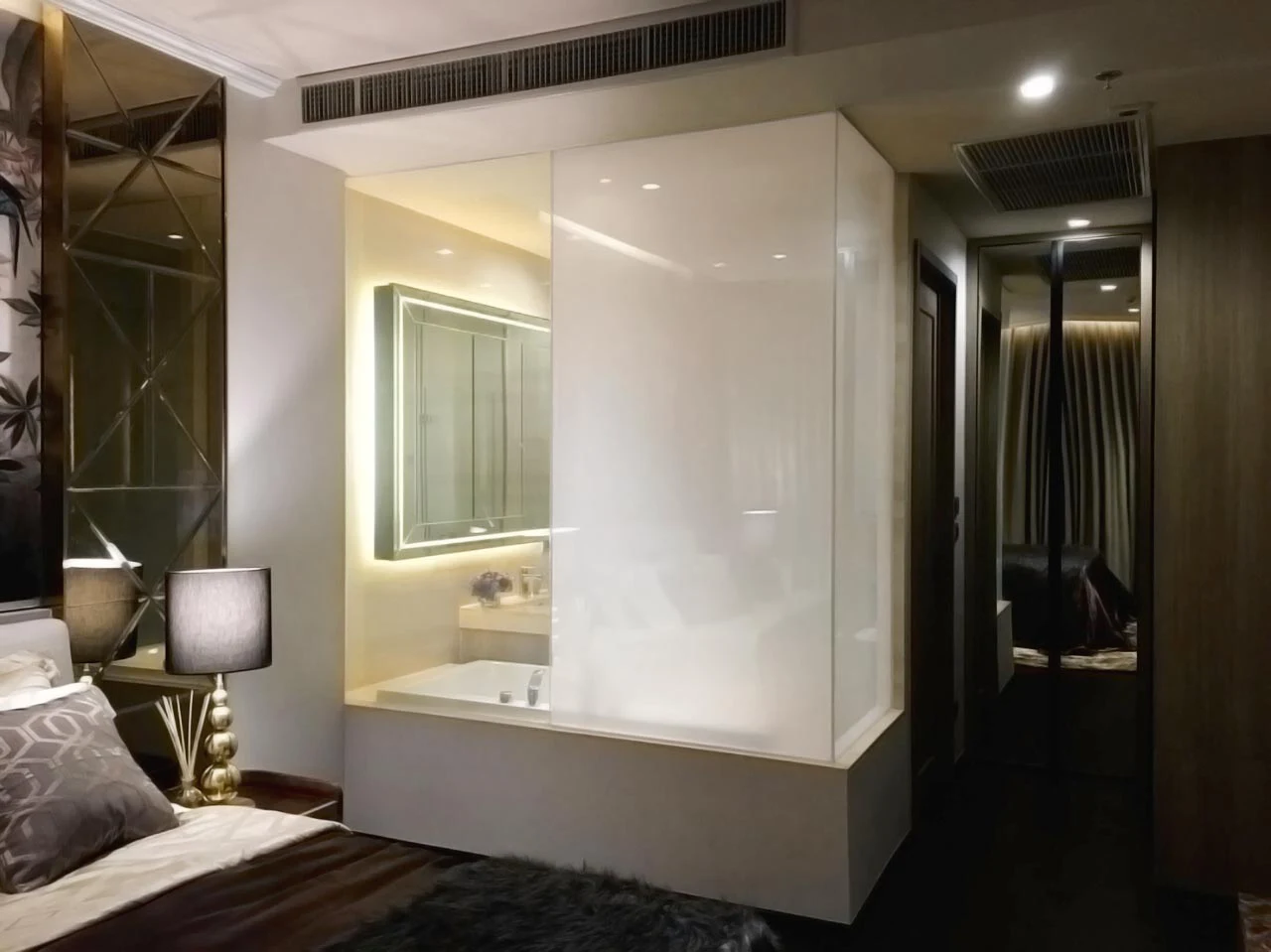OEM Factory for Shower Door Glass Thickness Options - Smart glass(Light control glass) – Yongyu
OEM Factory for Shower Door Glass Thickness Options - Smart glass(Light control glass) – Yongyu Detail:
Smart glass, also called light control glass, switchable glass or privacy glass, is helping to define the architectural, interior, and product design industries.
In the simplest definition, smart glass technologies alter the amount of light transmitted through typically transparent materials, allowing these materials to appear as transparent, translucent, or opaque. The technologies behind smart glass help resolve the conflicting design and functional demands for balancing the benefits of natural light, views, and open floor plans with the need for energy conservation and privacy.
This guide is intended to aid your research and decision-making process about implementing smart glass technology into your next project or including it to your products and services.

What Is Smart Glass?
Smart glass is dynamic, allowing a traditionally static material to become alive and multifunctional. This technology allows for the control of various forms of light including visible light, UV, and IR. Privacy glass products are based on technologies that allow transparent materials (like glass or polycarbonate) to switch, on-demand, from clear to shaded or completely opaque.
The technology can be integrated into windows, partitions and other transparent surfaces in various sectors, including architecture, interior design, automotive, smart retail windows, and consumer electronics.
There are two primary types of smart glass: active and passive.
These are defined by whether or not their changeability requires an electrical charge. If so, it’s categorized as active. If not, it’s categorized as passive.
The term smart glass mainly refers to active technologies in which privacy glass films and coatings, activated by an electrical charge, change the appearance and functionality of the glass.
Types of active switchable glass technologies and their common applications include:
• Polymer Dispersed Liquid Crystal (PDLC) glass, eg: typically seen in privacy partitions in various industries
• Suspended Particle Device (SPD) glass, eg: windows that tint to shade as seen in automotive and buildings
• Electrochromic (EC) glass, eg: coated windows that slowly tint for shading
The following are the two passive smart glass technologies and common applications for each:
• Photochromic glass, eg: eyeglasses with coatings that automatically tint in sunlight.
• Thermochromic glass, eg: coated windows that change in response to temperature.
Synonyms for smart glass include:
LCG® – light control glass | Switchable glass | Smart tint | Tintable glass | Privacy glass | Dynamic glass
The technologies that allow you to instantly switch surfaces from transparent to opaque are the ones referred to as Privacy Glass. They are particularly popular for glass-walled or partitioned conference rooms in agile workspaces based on open floor plans, or in hotel guestrooms where space is limited and traditional curtains ruin design aesthetics.

Smart Glass Technologies
Active smart glass is based on PDLC, SPD, and electrochromic technologies. It automatically operates with controllers or transformers with scheduling or manually. Unlike transformers, which can only change glass from clear to opaque, controllers can also use dimmers to gradually change voltage and control light to various degrees.

Polymer Dispersed Liquid Crystal (PDLC)
The technology behind PDLC films used to create smart glass contains liquid crystals, a material that shares characteristics of both liquid and solid compounds, which are dispersed into a polymer.
Switchable smart glass with PDLC is one of the most commonly used technologies. While this type of film is generally used for indoor applications, PDLC can be optimized to maintain its properties in outdoor conditions. PDLC is available in colors and patterns. It is generally available in both laminated (for newly fabricated glass) and retrofit (for existing glass) applications.
PDLC switches glass from dimmable degrees of opaque to clear in milliseconds. When opaque, PDLC is ideal for privacy, projection, and whiteboard use. PDLC usually blocks visible light. However, solar reflective products, such as the one developed by the material science company Gauzy, allows for IR light (which creates heat) to be reflected when the film is opaque.
In windows, simple PDLC limits visible light but does not reflect heat, unless optimized otherwise. When clear, PDLC smart glass has excellent clarity with about 2.5 haze depending on the manufacturer. In contrast, Outdoor Grade Solar PDLC cools indoor temperature by deflecting infrared rays but does not shade windows. PDLC is also responsible for the magic that enables glass walls and windows to become a projection screen or a transparent window instantly.
Because PDLC is available in a variety of types (white, colors, projection support, etc), it is ideal for multiple applications across diverse industries.

Suspended Particle Device (SPD)
SPD contains minuscule solid particles that are suspended in liquid and coated between two thin layers of PET-ITO to create a film. It shades and cools interiors, blocking up to 99% of incoming natural or artificial light within seconds of shifting voltage.
Like PDLC, SPD can be dimmed, allowing for a customized shading experience. Unlike PDLC, SPD does not turn completely opaque, and therefore, is not suited for privacy, nor is it optimized for projection.
SPD is ideal for exterior, sky or water-facing windows and can be used in indoor applications as well, where darkness is required. SPD is manufactured by only two companies in the world.

Product detail pictures:

Related Product Guide:
Our merchandise are commonly identified and dependable by end users and will meet continually altering financial and social desires for OEM Factory for Shower Door Glass Thickness Options - Smart glass(Light control glass) – Yongyu , The product will supply to all over the world, such as: Wellington, Pretoria, Grenada, We have customers from more than 20 countries and our reputation has been recognized by our esteemed customers. Never-ending improvement and striving for 0% deficiency are our two main quality policies. Should you need anything, don't hesitate to contact us.
We are really happy to find such a manufacturer that ensuring product quality at the same time the price is very cheap.




